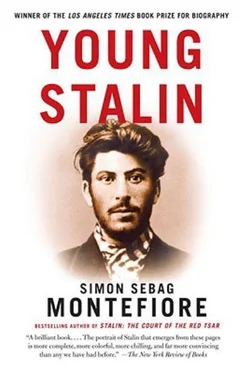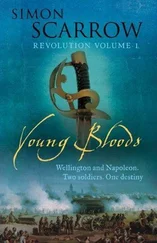Simon Sebag Montefiore
YOUNG STALIN




“All young people are the same,” said Stalin, “so why write… about the young Stalin?” Yet he was wrong: he was always different. His youth was dramatic, adventurous and exceptional. When in old age he reflected on the mysteries of his early years, he seemed to change his mind. “There are,” he mused, “no secrets that won’t be revealed for everyone later.” For me as a historian unveiling his clandestine life up to his emergence as one of Lenin’s top henchmen in the new Soviet government, he was right about the secrets: many of them can now be revealed.
There are few works on early Stalin (compared to many on young Hitler), but this is because there seemed to be so little material. In fact, this is not so. A wealth of vivid new material that brings to life his childhood and his career as revolutionary, gangster, poet, trainee priest, husband and prolific lover, abandoning women and illegitimate children in his wake, lay hidden in the newly opened archives, especially those of often-neglected Georgia.
Stalin’s early life may have been shadowy but it was every bit as extraordinary as, and even more turbulent than, those of Lenin and Trotsky—and it equipped him (and damaged him) for the triumphs, tragedies and predations of supreme power.
Stalin’s pre-revolutionary achievements and crimes were much greater than we knew. For the first time, we can document his role in the bank robberies, protection-rackets, extortion, arson, piracy, murder—the political gangsterism—that impressed Lenin and trained Stalin in the very skills that would prove invaluable in the political jungle of the Soviet Union. But we can also show that he was much more than a gangster godfather: he was also a political organizer, enforcer and master at infiltrating the Tsarist security services. In contrast to Zinoviev, Kamenev or Bukharin, whose reputations as great politicians are ironically founded on their destruction in the Terror, he was not afraid to take physical risks. But he also impressed Lenin as an independent and thoughtful politician, and as a vigorous editor and journalist, who was never afraid to confront and contradict the older man. Stalin’s success was at least partly due to his unusual combination of education (thanks to the seminary) and street violence; he was that rare combination: both “intellectual” and killer. No wonder in 1917 Lenin turned to Stalin as the ideal lieutenant for his violent, beleaguered Revolution.
This book is the result of almost ten years of research on Stalin in twenty-three cities and nine countries, mainly in the newly opened archives of Moscow, Tbilisi and Batumi, but also in St. Petersburg, Baku, Vologda, Siberia, Berlin, Stockholm, London, Paris, Tampere, Helsinki, Cracow, Vienna and Stanford, California.
Young Stalin is written to be read on its own. This is a study of Stalin’s life before power, up to his arrival in government in October 1917, whereas my last book, Stalin: The Court of the Red Tsar , covers Stalin in power up to his death in March 1953. Both are intimate histories of the man and politician but also of his milieu. I hope they will together form an introduction to the most elusive and fascinating of twentieth-century titans, showing the development and early maturity of the ultimate politician. What missing empathy in Stalin’s upbringing allowed him to kill so easily, but equally what quality equipped him so well for political life? Were the cobbler’s son of 1878, the idealistic seminarist of 1898, the brigand of 1907 and the forgotten Siberian hunter of 1914 destined to become the fanatical Marxist mass-murderer of the 1930s or the conqueror of Berlin in 1945?
My two books are not meant to form an exhaustive narrative history covering every political, ideological, economic, military, international and personal aspect of Stalin’s life. That has already been superbly done, in different eras, by two scholars—Robert Conquest, the founding maestro of Stalinist history, with his Stalin: Breaker of Nations and, more recently, Robert Service, with his Stalin: A Biography —and I do not think I could improve on their broader works.
I make no apology that my two books are tightly focused on the intimate and secret, political and personal lives of Stalin and the small circle that ultimately came to create and rule the Soviet Union until the 1960s. Ideology must be our foundation as it was for the Bolsheviks, but the new archives show that the personalities and patronage of a minuscule oligarchy were the essence of politics under Lenin and Stalin, as they were under the Romanov emperors—and just as they are today under the “managed democracy” of twenty-first-century Russia.
Stalin’s prolonged youth has always been a mystery, in many senses. Before 1917, he cultivated the mystique of obscurity but also specialized in the “black work” of underground revolution, which was, by its nature, secretive, violent and indispensible—but disreputable.
Once in power, Stalin’s campaign to succeed Lenin required a legitimate heroic career which he did not possess because of his experience in what he called “the dirty business” of politics: this could not be told, either because it was too gangsterish for a great, paternalistic statesman or because it was too Georgian for a Russian leader. His solution was a clumsy but all-embracing cult of personality that invented, distorted and concealed the truth. Ironically this self-promotion was so grotesque that it fanned sparks, sometimes innocent ones, which flared up into colossal anti-Stalin conspiracy-theories. It was easy for his political opponents, and later for us historians, to believe that it was all invented and that he had done nothing much at all—particularly since few historians had researched in the Caucasus where so much of his early career took place. An anti-cult, as erroneous as the cult itself, grew up around these conspiracy-theories.
The most intriguing rumour remains: was Stalin a double-agent for the Tsar’s secret police? The dictator’s most infamous secret policemen, Nikolai Yezhov and Lavrenti Beria, secretly sought such evidence to use against Stalin in case he turned against them—as indeed he did. It is significant that neither of them, with the absolute researching power of the NKVD behind them, ever found that “smoking gun.”
Yet there is a deeper mystery too: every historian has quoted Trotsky’s claim that Stalin was a provincial “mediocrity” and Sukhanov’s that he was just a “grey blur” in 1917. Most historians followed Trotsky’s line that Stalin was so greyly mediocre that he failed to perform in 1905 and 1917, becoming, in Robert Slusser’s words, “The Man Who Missed the Revolution.”
Yet, if this was so, how did the “mediocrity” seize power, outwit talented politicians such as Lenin, Bukharin and Trotsky himself, and coordinate his programme of industrialization, the savage war on the peasantry and the ghoulish Great Terror? How did the “blur” become the homicidal but super-effective world statesman who helped create and industrialize the USSR, outplayed Churchill and Roosevelt, organized Stalingrad, and defeated Hitler? It is as if the pre-1917 mediocrity and the twentieth-century colossus cannot be the same man. So how did one become the other?
Читать дальше
















